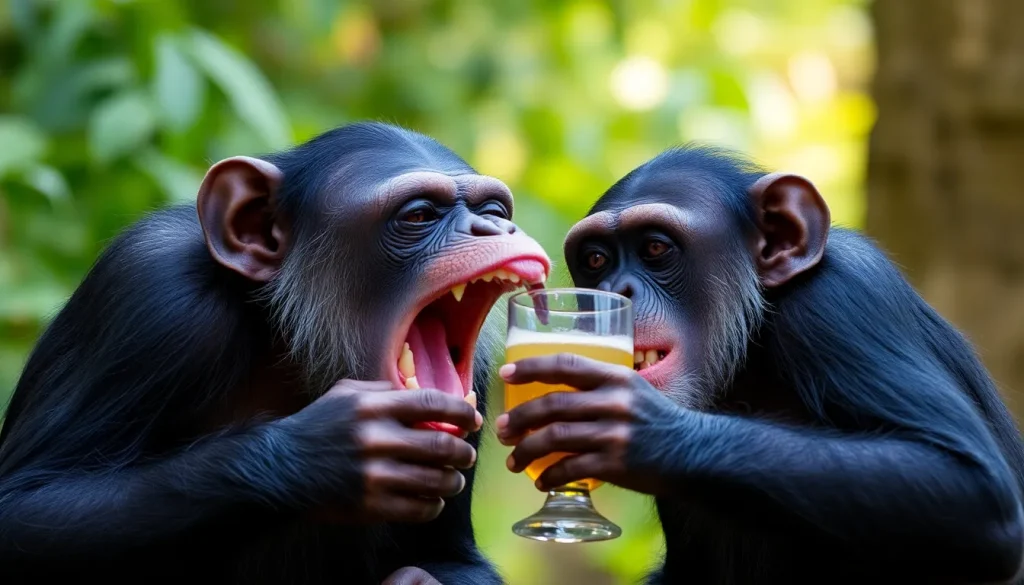Chimps drink alcohol equivalent to almost two daily servings

Have you ever wondered how closely related we are to our primate cousins? Recent studies reveal fascinating insights into the drinking habits of chimpanzees, suggesting that their relationship with alcohol could mirror certain aspects of our own. Let’s dive deeper into this intriguing topic.
Chimpanzees and their alcohol consumption habits
Recent research conducted at the Ngogo Chimpanzee Project in Uganda and the Tai National Park in Ivory Coast has uncovered that wild chimpanzees consume the equivalent of nearly two alcoholic drinks per day. This remarkable study estimated that these primates eat between 5 to 10 percent of their body weight in fruit daily, which translates to around 40 kilograms of food. The scientists involved meticulously collected fruit pulp samples from both sites, ensuring to preserve their integrity by freezing them in airtight containers.
Upon analysis, researchers determined the ethanol levels of the fruits using a variety of methods, including a breathalyzer and gas chromatography. The results indicated that the fruit from Uganda contained approximately 0.32 percent ethanol, while the Ivory Coast fruit had about 0.31 percent. Although these percentages may seem minor, the sheer volume of fruit consumed by the chimps amplifies the overall ethanol intake significantly.
According to Dudley, a co-author of the study, these figures may be conservative. He noted, “If the chimps are randomly sampling ripe fruit, then that’s going to be their average consumption rate, independent of any preference for ethanol.” He also suggested that the chimps might be selecting riper and sweeter fruits, which could lead to a higher intake of ethanol than the study reflects.
The evolutionary connection to alcohol
The implications of this study extend beyond chimpanzee behavior. Aleksey Maro, a graduate student at UC Berkeley and co-author of the research, posited that these findings could provide insight into our own evolutionary relationship with alcohol. He stated, “Our findings imply that our ancestors were similarly chronically exposed to dietary alcohol.” This notion is supported by the “drunken monkey hypothesis,” which suggests that our attraction to alcohol may have evolutionary roots linked to finding sugar-rich fruits.
Importantly, Maro pointed out that while chimpanzees may consume alcohol accidentally, humans tend to drink it intentionally. This distinction raises questions about our behavior and motivations surrounding alcohol consumption.
Primatologist Catherine Hobaiter, not directly involved in the study, provided further context by stating, “What we’re realizing from this work is that our relationship with alcohol goes deep back into evolutionary time, probably about 30 million years.” This indicates that for chimpanzees, consuming fermented fruit may serve a higher social purpose. Gathering around fallen fruits might be a way to strengthen social bonds among the group.
As chimps gather together to indulge in these boozy fruits, they may be engaging in social behaviors similar to human gatherings in pubs or bars. This raises fascinating questions about the role of alcohol in socialization across species.
Future research directions
The next phase of this intriguing research involves sampling the urine of chimpanzees to detect alcohol metabolites. This was previously done in a 2022 study on spider monkeys, which provided concrete evidence of their alcohol consumption. By analyzing chimpanzee urine, researchers aim to refine their estimates of daily ethanol-laden fruit intake. Maro has dedicated his summer to this research, often spending nights in trees to ensure he can collect samples effectively.
Such studies not only enhance our understanding of chimpanzee behavior but also shed light on our evolutionary past. Learning more about how these primates interact with alcohol can reveal patterns that might have influenced human alcohol consumption and social behaviors.
What does this mean for our understanding of alcohol consumption?
The findings about chimpanzees consuming alcohol raise several important questions:
- How does alcohol influence social structures in primate communities?
- What can we learn from primate alcohol consumption to understand human behavior better?
- Are there significant differences in how various primate species interact with fermented fruits?
- How does environmental availability of alcohol-rich foods affect primate socialization?
By exploring these questions, researchers can gain a more comprehensive view of the evolutionary significance of alcohol consumption, not just in chimpanzees, but across all species, including humans.
Conclusion
The study of chimpanzees consuming alcohol highlights the intricate connections between primate behavior and human evolution. As we continue to learn more about our closest relatives, we may uncover deeper insights into our own habits and social structures. Understanding these connections can help us appreciate the complexity of social interactions, not only among chimpanzees but also within our own species.
To explore more about this fascinating topic, check out this video that illustrates the social dynamics of chimpanzees enjoying fermented fruit:




Leave a Reply